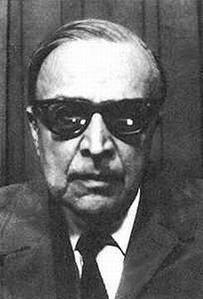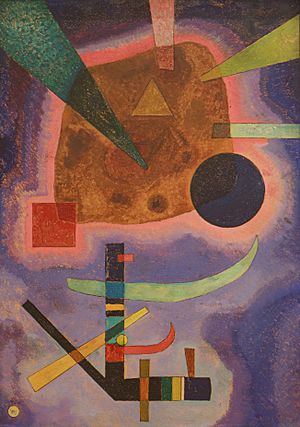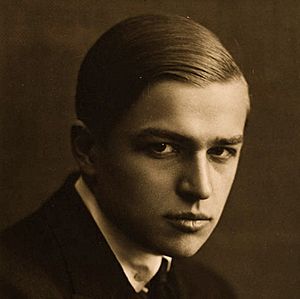Alexandre Kojève facts for kids
Quick facts for kids
Alexandre Kojève
|
|
|---|---|
 |
|
| Born |
Aleksandr Vladimirovich Kozhevnikov
28 April 1902 Moscow, Russian Empire
|
| Died | 4 June 1968 (aged 66) Brussels, Belgium
|
| Alma mater | University of Berlin University of Heidelberg |
| Era | 20th-century philosophy |
| Region | Western philosophy |
| School |
|
| Institutions | École pratique des hautes études |
|
Main interests
|
Philosophy of history |
|
Notable ideas
|
Subjects of desire |
Alexandre Kojève (born Aleksandr Vladimirovich Kozhevnikov; 28 April 1902 – 4 June 1968) was a Russian-born French philosopher and government official. His ideas greatly influenced 20th-century French philosophy. He helped connect the ideas of Hegel with modern continental philosophy. As a statesman, he played a key role in creating the European Union.
Contents
Life of Alexandre Kojève
Alexandre Kojève was born Aleksandr Vladimirovich Kozhevnikov in Russia. His family was wealthy and important. His uncle was the famous abstract artist Wassily Kandinsky. Kojève even wrote an important essay about Kandinsky's art in 1936.
He studied at the University of Berlin and Heidelberg in Germany. In 1926, he earned his PhD from Heidelberg. His studies focused on the Russian philosopher Vladimir Soloviev.
Early on, he was influenced by philosophers like Martin Heidegger. From 1933 to 1939, Kojève gave lectures in Paris. These lectures were about Georg Wilhelm Friedrich Hegel's book Phenomenology of Spirit.
After World War II, Kojève worked for the French government. He was a main planner for the European Common Market. This market later became part of the European Union.
Kojève was very good at languages. He studied and used Sanskrit, Chinese, Tibetan, Latin, and Classical Greek. He also spoke French, German, Russian, and English fluently.
Kojève died in Brussels in 1968. He passed away shortly after giving a speech for the French government. The speech was at the European Economic Community, which is now the European Union.
Kojève's Philosophy
Kojève was known for his unique way of understanding Hegel. He looked at Hegel's ideas through the lens of Karl Marx and Martin Heidegger. He was not a traditional Marxist.
One of his famous ideas was the "end of history". He believed that major ideological conflicts, like those that led to the French Revolution, had ended. He thought there was no longer a need for violent struggles to create a fair society with equal rights.
Kojève's "end of history" idea was different from later versions. He thought it would lead to a mix of socialism and capitalism. He did not believe that only liberal capitalism would win.
He also thought that capitalism and democracy were not failures. This was different from what many European thinkers believed in the 1930s. They thought these systems would be destroyed by communism or fascism.
Kojève wanted to protect western European countries, especially France. He did not want them to be controlled by the Soviet Union or the United States. He saw the capitalist United States as one side of Hegel's ideas. He saw the state-socialist Soviet Union as the other side. He believed that if either side won, it would lead to a rationally organized government without class differences.
Kojève's lectures on Hegel were very important. They were published as Introduction to the Reading of Hegel: Lectures on the Phenomenology of Spirit. Many famous thinkers attended these lectures. These included Raymond Queneau, Georges Bataille, Maurice Merleau-Ponty, and Jacques Lacan.
His ideas about the master–slave dialectic greatly influenced Jacques Lacan's mirror stage theory. Other French thinkers like Michel Foucault and Jacques Derrida also said Kojève influenced their work.
Kojève also wrote about Immanuel Kant. He wrote articles on how Hegelian and Marxist thought related to Christianity. His book Esquisse d'une phenomenologie du droit (published after his death) explored ideas of justice. He also wrote about how wisdom develops over time.
Friendship with Leo Strauss
Kojève had a close and lifelong friendship with Leo Strauss. They met as philosophy students in Berlin. They had great respect for each other's ideas. Kojève once said he would not have known what philosophy was without Strauss.
In the 1930s, they started a debate about philosophy and politics. Kojève, who worked for the French government, believed philosophers should help shape political events. Strauss, however, thought philosophy and politics were very different. He believed philosophers should not play a big role in politics. He pointed to Plato's bad experiences in Syracuse. Strauss thought philosophers should only influence politics enough to keep philosophical thinking free.
Despite their different views, Strauss and Kojève remained good friends. Strauss even sent his best students to Paris to study with Kojève. These students included Allan Bloom and Stanley Rosen. Bloom helped make Kojève's works available in English.
Kojève and the Soviet Union
Kojève often called himself a "Stalinist," but this was usually ironic. He often looked down on the Soviet Union. He thought its social policies were terrible. He also found its claims of being a truly classless state ridiculous.
Kojève believed that traditional Marxism was outdated in developed capitalist countries. He even jokingly called the capitalist Henry Ford "the one great authentic Marxist of the twentieth century." He repeatedly said that the Soviet Union was the only country where 19th-century capitalism still existed.
His "Stalinism" was mostly a joke. But he was serious in one way: he saw the Soviet Union under Stalin as trying to bring about the "end of history." He saw the willingness to remove people who didn't support the government as a repeat of the Reign of Terror during the French Revolution.

See also
 In Spanish: Alexandre Kojève para niños
In Spanish: Alexandre Kojève para niños
- Jean Wahl
- Post-Kojèvian discourse
 | Georgia Louise Harris Brown |
 | Julian Abele |
 | Norma Merrick Sklarek |
 | William Sidney Pittman |


